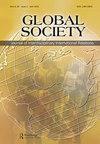我今天感觉有点同性恋,所以我请病假:20世纪70年代瑞典同性恋活动家“反向话语”的形成
IF 2.3
Q2 INTERNATIONAL RELATIONS
引用次数: 2
摘要
本文围绕1979年瑞典围绕“同性恋”的法律和认知之争展开,这场斗争最终导致同性恋被认定为“疾病”而被废除。除此之外,同性恋积极分子还向社会保险局(SIA)“请病假”,声称他们无法工作,因为他们是同性恋(被解读为精神失常)。电话可以理解为“反向”语篇的形成;也就是说,同性恋者开始以自己的名义发言,同时使用与他们被贴上标签相同的类别。通过分析这种抵抗和在瑞典国家健康和福利委员会(NBHW)组织的静坐,我们得出结论,作为一种富有成效但又具有破坏性的实践,反向话语不是一种单手和无陪伴的抵抗策略,而是在一个复杂的抵抗和权力网络中作为许多实践中的一种实现。本文章由计算机程序翻译,如有差异,请以英文原文为准。
I Felt a Little Homosexual Today, So I Called in Sick: The Formation of “Reverse Discourse” by Swedish Gay Activists in the 1970s
ABSTRACT This article revolves around the legal and epistemic battles around “homosexuality” in Sweden in 1979, which led to the abolition of homosexuality being classified as a “disease”. Among other things, gay activists “called in sick” to the Social Insurance Agency (SIA) and claimed that they were unable to work because they were homosexuals (read as mentally disordered). The phone calls can be understood as a formation of “reverse” discourse; that is, gay people starting to speak on their own behalf, while using the same categories by which they were labelled. By analysing this resistance and a sit-in that was organised at the Swedish National Board of Health and Welfare (NBHW), we conclude that reverse discourse, as a productive yet rupturing practice, is not a single- handed and unaccompanied resistance strategy but materialises as one practice among many in a complex web of resistance and power.
求助全文
通过发布文献求助,成功后即可免费获取论文全文。
去求助
来源期刊

Global Society
INTERNATIONAL RELATIONS-
CiteScore
3.10
自引率
6.20%
发文量
32
期刊介绍:
Global Society covers the new agenda in global and international relations and encourages innovative approaches to the study of global and international issues from a range of disciplines. It promotes the analysis of transactions at multiple levels, and in particular, the way in which these transactions blur the distinction between the sub-national, national, transnational, international and global levels. An ever integrating global society raises a number of issues for global and international relations which do not fit comfortably within established "Paradigms" Among these are the international and global consequences of nationalism and struggles for identity, migration, racism, religious fundamentalism, terrorism and criminal activities.
 求助内容:
求助内容: 应助结果提醒方式:
应助结果提醒方式:


